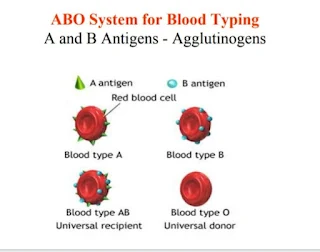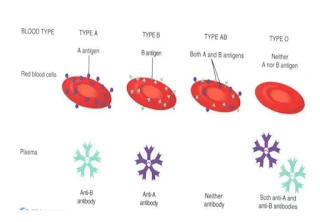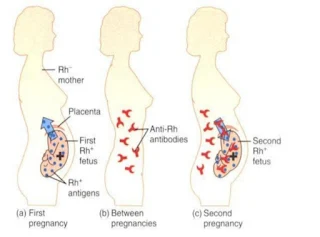Objective
1. Describe the basis of blood typing.
2. Know about ABO and Rh system of blood typing and their clinical Significance.
3. Describe incompatibilities ABO and Rh Systems.
4. Know the different types of blood transfusions and their complications ( transfusions reaction ).
5. Describe the basis of the blood typing and crossmatching tests for a safe blood transfusion.
Basis of Blood grouping or Typing
(Multiplicity of Antigens in the blood cells)
- At least 30 commonly occurring antigens have been found on the cell membrane of RBCs.
- These can cause Ag-Ab (antibody) reaction if mixed with plasma that contain Ab against these Ag.
- According to presence or absence of these antigens blood is classified into several groups or types.
- Two groups of Ag can cause transfusion reactions more than others: ABO and Rh systems of Ag.
ABO System for Blood Typing
A and B Antigens Agglutinogens
ABO blood types
Relative frequency of different blood types:
-They are naturally occurring antibodies

Rh System for Blood Typing
• If type D antigen is present on RBC > Rh +ve
• Differences between ABO and Rh Ab?
• Anti-Rh antibodies are not naturally occurring Ab.
• Previous exposure to Rh antigen is required.
- Rh tve blood transfusion.
- Rh-ve women pregnant with Rh +ve baby.
• Anti-Rh Ab can cross the placenta.
Haemolytic Disease of the Newborn (HDN)
- Rh incompatibility >Erythroblastosis Fetalis (HDN).
- Rh-ve lady marrying Rh+ve man.
- If baby is Rhtve, fetal RBC leaks to maternal circulation during placental separation (deliveryor abortion).
- Mother starts to make anti-Rh Ab.
- Next pregnancy with Rhtve baby > anti-Rh Ab pass to baby and cause agglutination and hemolysis of his RBC.
Prevention
Anti-D antibodies (RhoGam) injection given to Rh -ve mothers after delivery of Rh +ve baby.
1 minute Quiz
How does a RhoGam injection (anti-D antibodies) prevent HDN in a future pregnancy with an Rh tve baby?
Blood Transfusions
Indications
1. Haemorrhage
2. Loss of one element of blood as in anemia, leucopenia and purpura
Types:
-Heterologus >from other person of the same species
-Autologous> from the same person
Transfusion Reactions resulting from
mismatched blood types
- Agglutination and delayed hemolysis of donor's RBC (or immediate intravascular hemolysis) >Jaundice
- Renal failure
Renal tubular blockage by hemoglobin
Pre-transfusion Tests
For a safe blood transfusion, the following tests are done:
- Blood typing
- Cross-matching
Blood typing
Blood typing, showing agglutination of cells of the different blood types with anti A or anti-B agglutinins in the seraAll Types blood Group Slides
Cross-matching
- Once patient's blood type is known, donor blood of the same ABO and Rh type is selected.
- Possible donor RBC's are mixed with the recipient's serum. If no agglutination, no Ab in recipient blood will attack donor's RBCs

















Comments
Post a Comment
Thanks to Come on Comment section